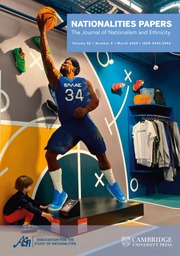- ISSN: 0090-5992 (Print), 1465-3923 (Online)
- Frequency: 6 issues per year
Digital archives
Digital archives are available for this journal, providing instant online access to a repository of high-quality digitised historical content. For more information, please see the Cambridge journals digital archive.
Content preservation
Cambridge University Press publications are deposited in the following digital archives to guarantee long-term digital preservation:
- CLOCKSS (journals)
- Portico (journals and books)
This journal is published by Cambridge University Press on behalf of its managers and owners, the Association for the Study of Nationalities.
- On the cover
-
On the Cover Photo Taken by Roi Pérez: In 2022, I was conducting fieldwork in Scotland as part of my research on Scottish nationalism. In the picture, we can see a march organized by “All Under One Banner.” This association organizes various marches in favor of Scottish independence throughout the country, urging participants to carry Scottish flags. The march ended at the Scottish Parliament, where members of the association and representatives of the party in government, the Scottish National Party (SNP), argued for Scottish independence as the best option for Scotland’s future. This march had special symbolism because Scottish independence supporters were awaiting the final decision of the Supreme Court on whether the Scottish Parliament could autonomously organize a legal independence referendum. In the image, we see a group of men leading the demonstration dressed in typical Scottish attire while playing the bagpipes. Behind them, protesters carry a flag with the inscription: “Our Right to Decide.” (Royal Mile, Edinburgh, October 1, 2022).

